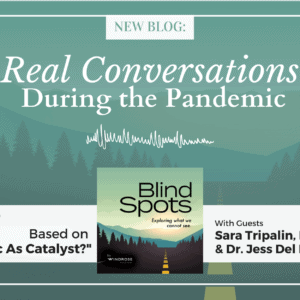
In Milwaukee Magazine’s August issue, Dr. Chantelle Thomas was one of two experts discussing the affects of the COVID-19 pandemic on mental health, including alcohol and drug abuse. Please take a moment to read the article below.
How to Get Local Help If the Pandemic Has Affected Your Mental Health
Staying home and limiting social contact has helped keep us safe and healthy, but it can also increase feelings of isolation and anxiety, and can trigger alcohol and drug abuse. Two local doctors discuss how to identify symptoms and where to find help.
BY EVERETT SULLIVAN, Milwaukee Magazine, August 28, 2020
MILWAUKEE MAGAZINE: How has the coronavirus crisis affected demand for mental health and addiction services?
DR. JUSTIN KUEHL: The COVID crisis has definitely led to increased stress, increased risk of depression and anxiety, among all individuals. A lot of the issues that are common with depression such as insomnia, isolation, lack of interest in normal pleasurable activities – those are things that have really ramped up because of being isolated, because of having to socially distance from others. There’s definitely an ongoing risk here in the community, and I don’t think we’ve seen the biggest wave of effects yet. It’s something that we’re definitely, as mental health professionals, aware of and really concerned about as we continue to move forward through this crisis.
DR. CHANTELLE THOMAS: I’m working in a residential environment for substance abuse treatment and co-occurring mental health issues. I think we’ve definitely seen an upsurge in different types of issues emerging as a result of shelter-at-home. Folks who may have been struggling before, now with this current situation, are more visible to family members, because everybody is in the same space. I think not having other outlets for relieving stress or anxiety or the pressure that’s building up around the uncertainty that we’re all facing is leading people to more desperately go to the thing that they know can provide them with some temporary relief.
MM: What symptoms do you think friends and family should look for in loved ones who might be struggling with addiction or depression?
JK: One of the things to look for is changes in patterns of behavior. Sleep can be affected as part of either depression or anxiety, so if family members notice a change in sleep patterns, that’s definitely a warning sign. Lack of interest in activities that previously they were really interested in. Mood changes, looking more depressed, expressions of hopelessness. Those are all things that family members really need to be attuned to and listening for in conversations. The next step is realizing that there is help available. Just because we’re in the midst of this crisis doesn’t mean that our community providers, our institutional providers, our county providers aren’t still there and willing to help. For example, here at Milwaukee County Behavioral Health Division, our crisis service continues to operate in some modified ways, but still in the same way we were before COVID. Our crisis line number is available; that’s a line people can call just to get advice, to get referrals, to even talk through if they’re having a really tough time to the extent of even having suicidal thoughts. Our crisis clinicians, who go out and do assessments, are still able to do that. So, if it really comes to the need for a face-to-face intervention, that’s something Milwaukee County can choose to offer.
CT: It’s a really good time to be curious about what’s happening for people and to inquire and ask questions. In those moments when people are not able to talk about it or want to shut the conversation down very quickly, that can be a sign of concern. Access to help has actually increased for a lot of people who are very vulnerable. Part of that has come with the support of insurance providers and the state sanctioning telehealth and mental health therapy over the phone or over video conferencing. In terms of contacting our clinic, the main number there is not an automated person, it’s an individual who answers the phone every time. We also provide a service when people are looking for substance abuse treatment that helps direct them to a better fit if our program isn’t right for you. I will say for family members or friends that are concerned and are looking to reach out, be mindful of what sort of messaging you’re putting out about yourself and how you’re managing this situation. I think family happy hours can be a really fun thing when appropriate, but if most family gatherings are virtually happening in the context of alcohol or substance use, it really becomes alienating for someone who wants to connect, if that’s the platform in which it’s happening.
MM: In a major crisis event like this, what changes in alcohol consumption do you see?
CT: I’ve been struck by how much alcohol is talked about in the context of this pandemic. People are struggling to find reasons to connect virtually unless they involve alcohol a lot of the time. It’s like, “Hey, let’s have a drink on Zoom,” or, “Let’s FaceTime and have a drink,” as opposed to, “Hey, let’s just connect.” I imagine for people who are in recovery or trying to reduce their use, how much more alienated those individuals might feel if they don’t feel like that’s a resource for relieving stress.
MM: The coronavirus has severely affected communities of color in America. Justin, how would you say that this has translated to the mental health of members of those communities in Milwaukee County?
JK: It’s the anniversary today [May 20] of the county executive declaring racism a public health crisis here in Milwaukee. I think it’s striking because it’s something that Milwaukee County as a whole has been really in tune to, really trying to help address some of the effects of racism and the disparity that our community experiences. So, you had that backdrop, and then you add in COVID. What this has really shined more light on is the fact that when you have pre-existing disparities, such as health disparities that make people more susceptible to COVID, that actually increases mental health concerns in terms of anxiety and the worry about getting sick. So you just start compounding some of those pre-existing conditions with the current situation which leads to more stress, potentially more depression, and it’s definitely harder to cope overall.
MM: How do you think isolation within lockdown has affected mental health and addiction?
JK: As human beings, we’re social individuals. We want to connect. We want to reach out. The lack of physical touch alone is such a huge variable. As we hear about discouraging handshakes, discouraging hugs, not being able to have those kind of connections with others, that has a huge impact on mental health.
CT: Some people say addiction is a disease of isolation, because one of the major aspects of what happens for people who end up in a use cycle is that some make a choice to physically distance themselves from people and use in isolation, and also, when you’re using in a room with other people, it immediately creates a barrier. A lot of the time, in the world of treatment, what we’re trying to assess are the barriers to connection. That’s one of the primary ways to promote healing in the recovery process. And so, if you actually have an entire environment that’s promoting, for completely understandable reasons, isolation, it just makes it much easier for people to be in hiding and to feel alienated. One of the biggest things that we work on with folks is developing the muscle of asking for help.
MM: The most vulnerable groups affected by COVID-19 are older adults and those with underlying conditions. How has their mental health has been affected as this crisis has unfolded?
JK: For groups of older adults and individuals with disabilities, even before COVID, there were some limitations and barriers to social connectedness for those who live in, say, a congregate setting like supported housing. There sometimes isn’t the same community involvement, community connectedness that other individuals enjoy. So now you layer on COVID. It’s really amplified some of those pre-existing conditions. That feeling of stress and anxiety feeds into the overall environment and layers on additional problems and stressors for those individuals.
MM: There’s been a constant stream of news related to COVID-19. How do you think someone who wants to stay informed can do that without getting overwhelmed?
JK: I think that there’s really two important takeaway points. One is that you really need to find the good sources of information. It’s important to turn to good sites: the CDC, our state government and Milwaukee County provide good ongoing guidance. The second major take-home point is to know when to quit. We have the tendency to just want to continue to search and get more information. But we need to be able to say ‘this is enough,’ because it does become overwhelming, and it actually becomes anxiety-provoking, when you just get so much information – and sometimes contradictory information – which then leads to further anxiety and further worry, so know when to say ‘when.’
MM: What do you think everyone can learn about their own relationship with alcohol through being in lockdown?
CT: This is a really interesting opportunity to learn about what it means for you to take care of yourself in the face of stress, in the face of a crisis. So many people are defining self-care as drinking, giving themselves a way to check out a little bit, to reduce anxiety, to alleviate stress. A really good way to test your relationship with alcohol or a substance, when you’re concerned about it, is to attempt pulling back on it or stopping: starting to set goals, maybe not drinking on a certain day. Now, I will put that caveat that for people who have a strong drinking relationship on a daily basis, we never encourage people to stop without medical support because that can be dangerous.
MM: For anyone who wants to seek help, what kind of guidance would you offer them?
JK: From a Milwaukee County standpoint, we have the crisis line, we have our mobile teams, we have our network of contracted mental health providers that’s available and willing to help in these situations.
CT: When you start to let people know that you might be struggling, you will be very shocked to learn the number of people who have also been struggling and might be able to share something with you about talking to a therapist or talking to a mental health professional. Those are things that aren’t likely to come up in conversation until someone takes the risk of saying it. And then of course, reaching out to our facility, The Manor. There’s a contact number that can help guide you to a person who can help you navigate what kind of resources might be available to you if you’re struggling.




